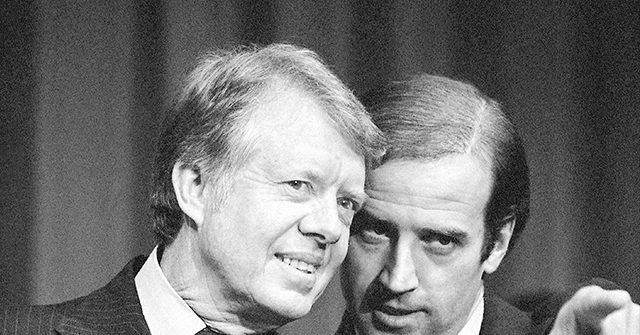
Starting on 2021, this author wrote a total of 10 articles for Breitbart News on similarities between the presidencies of Joe Biden and Jimmy Carter.
This eleventh piece will likely be the last; now, the Biden administration can be turned over to historians, who will take note of yet another commonality between the 46th president and the 39th president: both were one-termers. (You can see all my earlier pieces, here, here, here, here, here, here, here, here, here, and here.)
Biden’s presidency began with a bang. He had vast ambitions to be another Franklin D. Roosevelt, enacting big, bold—and lefty—New Deal-type programs, some of which he passed.
In his own not-so-modest self-evaluation, Biden predicted he would be remembered as more consequential than Barack Obama, the first Black president, as well as a two-termer—and also the man who, back in 2008, tapped Biden for the vice presidency, thus lifting Biden to the pinnacle of national renown.
Yet in return, Biden bore no small amount of jealousy, even bitterness, toward the 44th president, who wanted to see Hillary Clinton, not Biden, succeed him in 2016. Historian will note that for all his self-declared nice-guy-ness, Biden has always had a chip on his shoulder the size of Delaware.
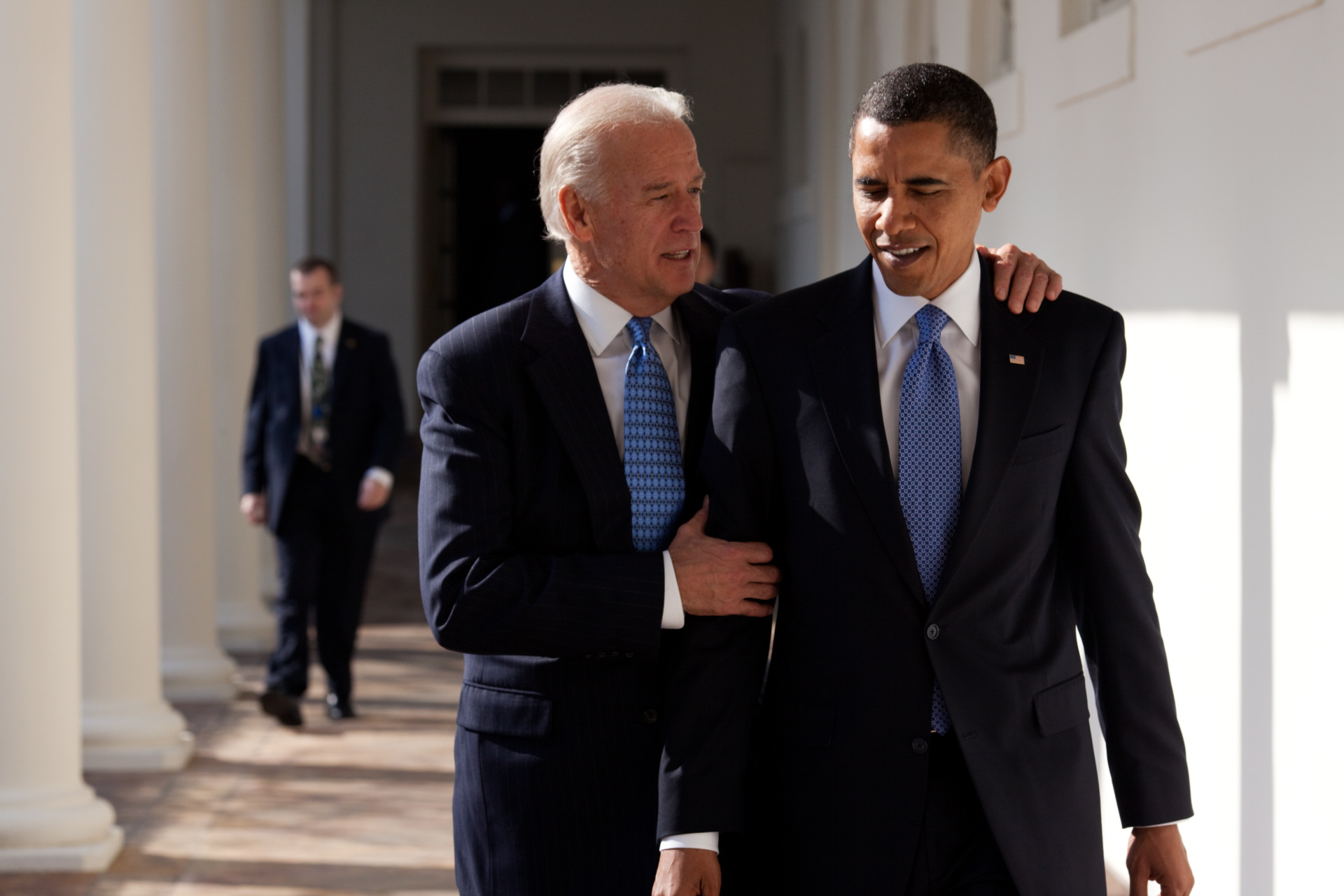
President Barack Obama walks with Vice President Joe Biden along the White House Colonnade on February 3, 2010. (Official White House Photo by Pete Souza)
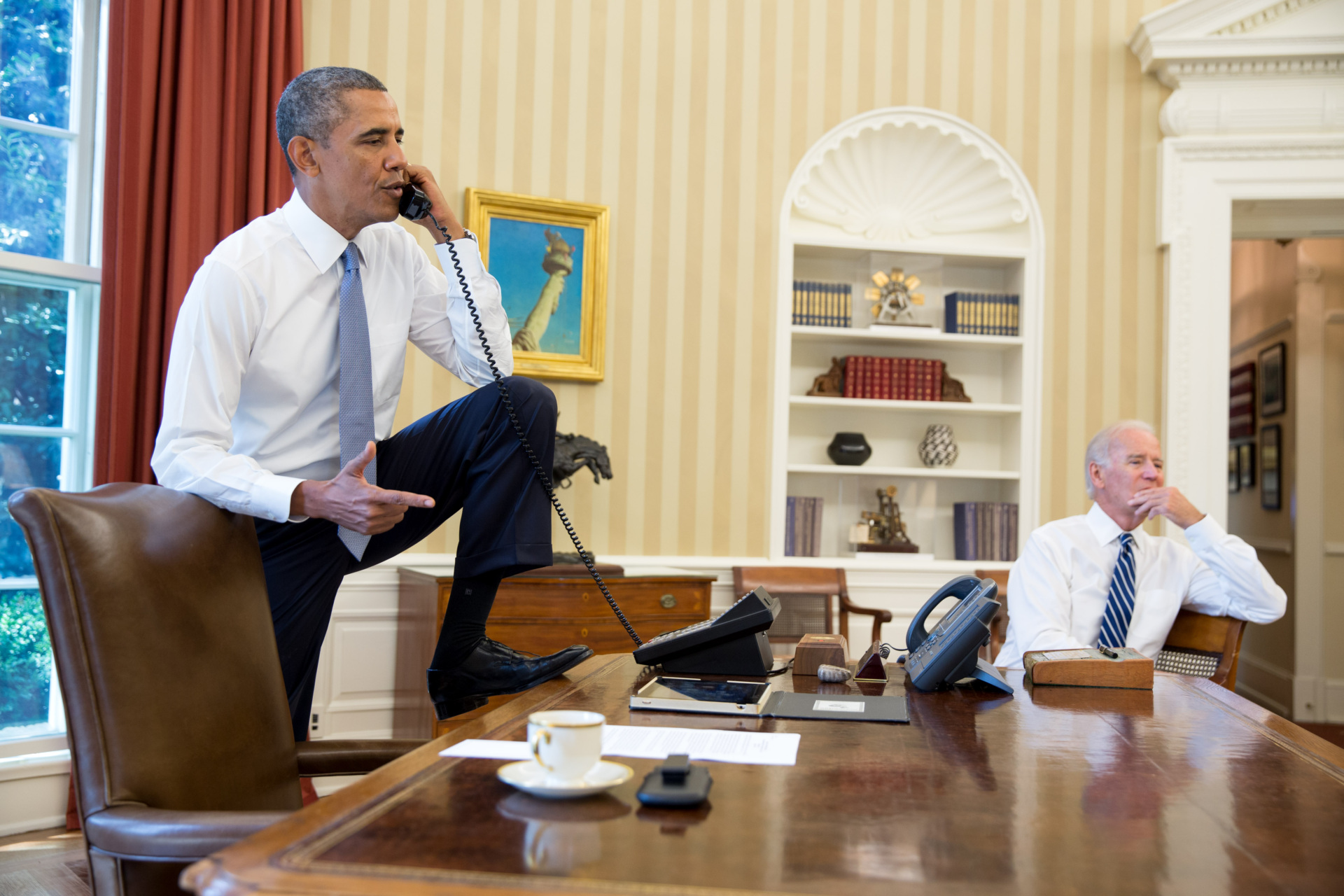
President Barack Obama talks on the phone in the Oval Office on August 31, 2013, while Vice President Joe Biden listens. (Official White House Photo by Pete Souza)
To be sure, many politicians have the trait of high-octane intensity. In Biden’s case, his ambition vroom-vroomed over a half-century. The legendary vote-hound won a total of ten general elections—first, in 1970, for the New Castle County council, then six for the U.S. Senate, two for the vice presidency, and for the presidency in 2020—even as he made two failed bids for the Democratic presidential nomination in 1988 and 2008, and come to think of it, a third busted play in 2024.
Biden’s obsessive banging for fame and power makes it all the more remarkable that his presidency is ending with a whimper. He was forced to abandon his re-election effort in July, and now he sees that Trump, not Kamala Harris, will be his Oval Office successor.
Still, Harris’s losing doesn’t seem to bother Biden, nor his wife, too much—the couple distributes widely blame for the waylaying of their plans for a second term. Intriguingly for historians, from the beginning of the Biden presidency, West Wing aides had it in for Harris; she was portrayed in leaks as a brittle nitwit. Perhaps that sniping and slagging was deserved; in any case, it hurt Harris, making her sudden ascension as the presidential nominee seem, well, weird.
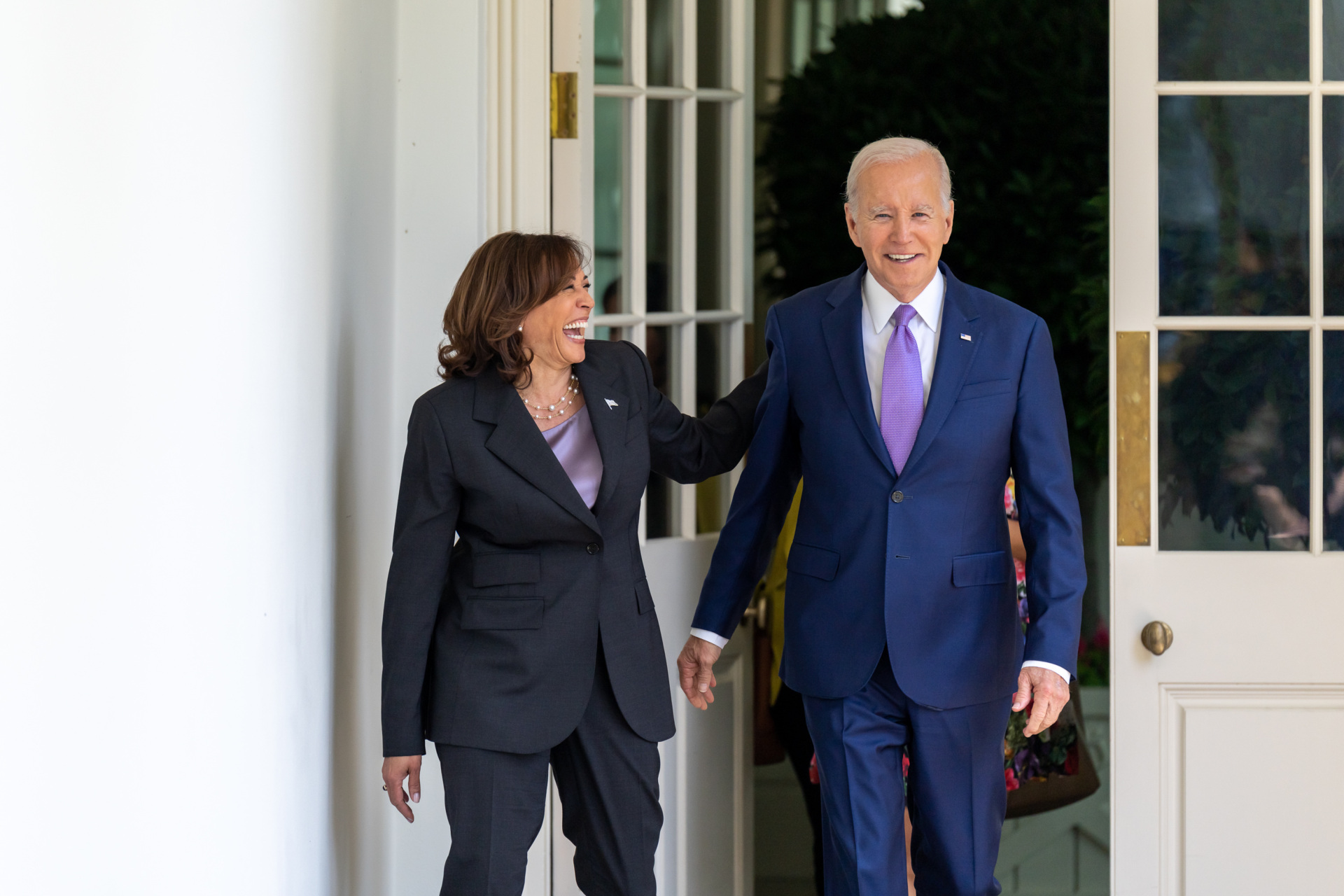
President Joe Biden walks with Vice President Kamala Harris along the White House Colonnade on May 26, 2023. (Official White House Photo by Adam Schultz)
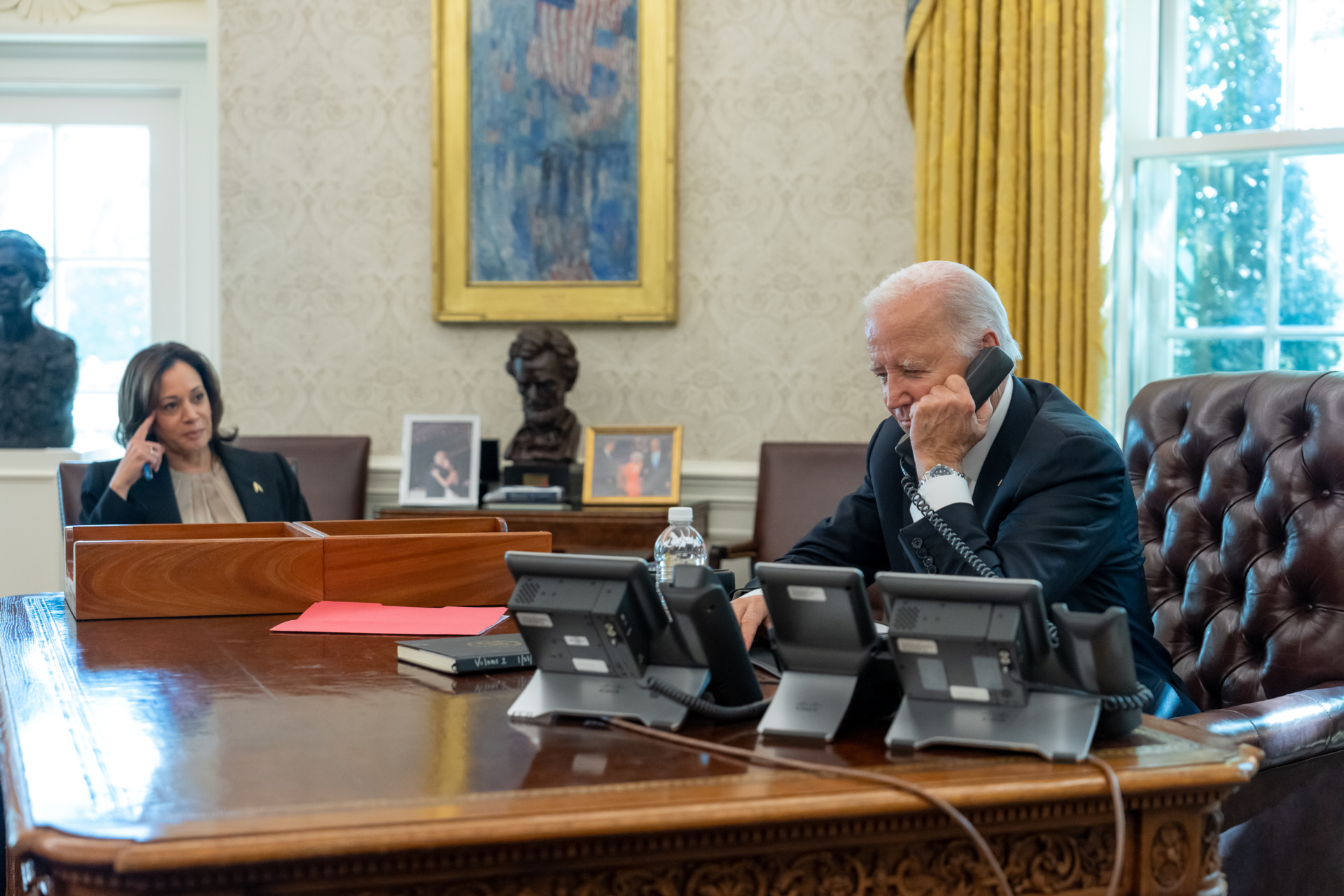
President Joe Biden talks on the phone in the Oval Office while Vice President Kamala Harris listens on October 10, 2023. (Official White House Photo by Adam Schultz)
Yet no matter what their interpersonal feelings, Biden and Harris will be intertwined in history. Under the headline, “How Harris’s Loss Could Haunt Biden’s Legacy,” The New York Times observed:
Among his closest allies, Mr. Biden will be remembered as the person who vanquished Mr. Trump in 2020 and ended his own re-election campaign for the good of the country. But many Democrats are already casting him in a much different, and deeply unflattering, light: as a one-term president who set his party on a path to failure in 2024 . . . Mr. Trump’s return to power is now destined to be at the center of Mr. Biden’s legacy.
In that article, presidential historian Douglas Brinkley jumped in to the fray, aiming at Biden: “He was supposed to be the bridge, a transition bridge for the next generation of Democrats.” Yet instead, Brinkley continued, Biden “blew up the bridge.” Ouch.
In fact, the immediate Biden post-presidency will be consumed by scoopy and juicy recriminations, as the Biden and Harris camps trade blame for the Democrats’ defeat, with former Obama officials joining in the crossfire.
Yet future chroniclers will likely assign most of the blame to Biden. He campaigned in 2020 as “Middle Class Joe,” or “Scranton Joe,” or “Amtrak Joe,” and yet once in office, he governed well to the left, especially on cultural issues.
Famously, his nominee for the Supreme Court, Ketanji Brown Jackson, refused to be pinned down on the simple question, “What is a woman?” And two of his flamboyant transgender appointees, one to the Public Health Service and the other to the Department of Energy, formed a bizarre visual tableau. These were not the faces Middle America was looking for.
All that weirdness helps explain why Democrats lost their own former base in the working class among non-college-educated voters and those from families making $100,000 or less.
Many of those working stiffs are Hispanic, and they have opinions similar to those of other workers in favor of normalcy. In Texas, for instance, Democrats were hoping to upset the vulnerable Republican Sen. Ted Cruz, and yet Cruz came storming back, blitzing his Democratic challenger with anti-trans ads and digs during debates.
Afterward, the chairman of the Texas Democratic Party, Gilberto Hinojosa, warned that if Democrats couldn’t get normal on the trans issue, “There are going to be long term political consequences.” For his candor, Hinojosa was hosed; fellow Democrats, still trans-mesmerized, forced him to recant and apologize.
Okay, that’s what it’s like inside today’s Democratic Party, even in Texas. Yet Hispanic men who are not on the party payroll are going to continue to think that boys shouldn’t be in girls’ locker rooms.
Surveying the Democrats’ mess, Texas Gov. Greg Abbott explained why the Lone Star State is, in fact, getting more red: “One big reason is that Hispanics in Texas have realized that Republicans align with their values of faith, family, freedom and free enterprise. They support capitalism & pro-energy production policies & no boys in girls sports.” [emphasis added]
In fact, the realization that transgenderism has hurt the Democrats nationwide must be factored into Biden’s legacy, because he’s the president who, starting on day one, issued the executive orders and other edicts mandating trans-everything.
Was this really what Biden wanted? Down deep, did he think trans was a good idea? Probably not. And yet Biden, always flexible, chose to go with the flow.
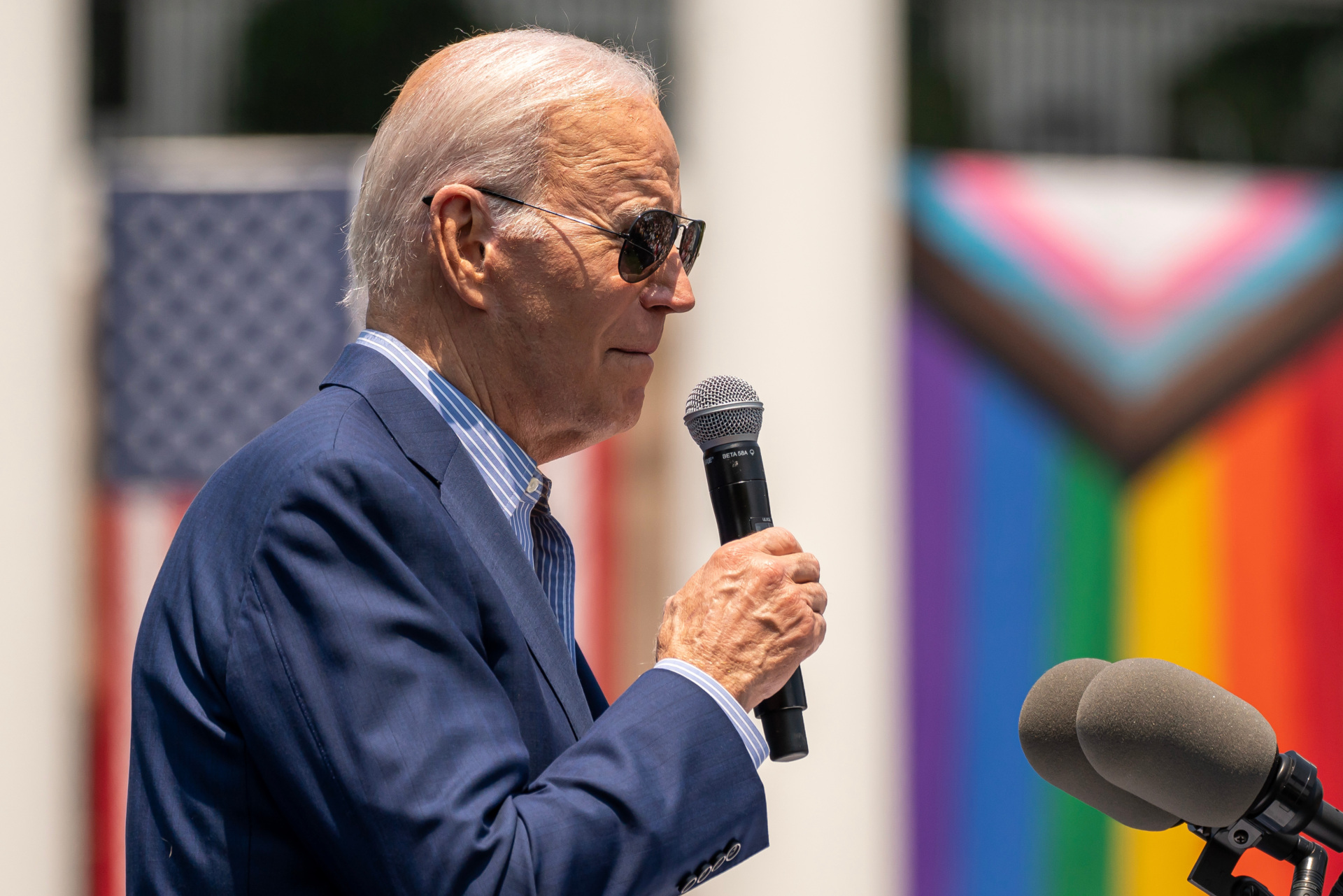
President Joe Biden speaks during a Pride Month celebration event at the White House on June 10, 2023. (Nathan Howard/Bloomberg via Getty Images)
Here again, Biden 46 echoes Carter 39. Himself an evangelical Christian, Carter was personally a moderate. And yet during his four years in office, 1977 to 1981, the Democratic Party was moving left—Carter had plenty of ideological trouble inside his own administration—and there wasn’t much he could do about it. As a result, he looked weak.
The political science term for this sort of presidential predicament is “disjunction.” Both Carter and Biden had a bad case of it, and hence, the inability to forge their presidency into a strong tool.
We could go on. Half a century ago, Carter was substantially undone by inflation caused in part by green policies that crimped the supply of energy. Yes, today that sounds familiar; one post-election poll showed that the top issue for anti-Harris voters was, yes, rising prices. And then there’s foreign policy weakness, and the border, and scandals. It’s hard to be a good president, keeping all the moving parts meshing.
So, the historical judgment on both Carter and Biden is likely to be harsh. Confronted with disjunctive forces within, they let them get worse—and Americans noticed.
If the commander-in-chief isn’t commanding, if the trumpet is uncertain, if the word goes forth as a mumble, then people will lose heart. And if the voters lack confidence in the incumbent, a change is gonna come.
